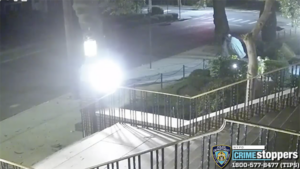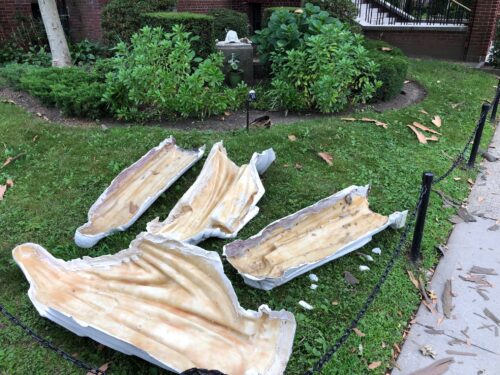By Jessica Easthope
Religious statues broken into pieces and hurled violently from a shrine – this scene has become increasingly common for Catholic churches, but what happens when the financial cost and emotional toll of vandalism are too much to bear? Will churches and schools be forced to keep displays of faith out of public view?
It has been two years and Father Josephjude Gannon says it still hurts. Under the cover of darkness, a woman tore down the rosary stations at St. Gerard Majella parish in Hollis, Queens. The damage costed his parish upwards of $20,000.
Things can be replaced, but Father Gannon says the feeling lasts, which is why his solution is more security and education.
“We should invite people to understand what they are, why we have them,” he said. “An education campaign.”
Many religious artifacts are precious in more ways than one. That’s because some are made of real gold, exquisite detail, they’re handmade or imported. A statue of Our Lady of Guadalupe destroyed at Our Lady of Solace in Coney Island cost $7,000 and another statue at St. Adalbert’s in Elmhurst, Queens dates back more than a century.
In May, a wooden crucifix at St. Athanasius in Bensonhurst, Brooklyn was toppled to the ground and broken. It cost the parish a $20,000 price tag as collections suffered during the pandemic. Pastor, Msgr. David Cassato has replaced it, but says removing it is not an option.
“Good conquers over evil, love conquers over all,” he said. “We have to build and rebuild in order to show how much we love our faith.”
Protecting property is important, but Msgr. Cassato wants faith to get right up in the face of hate – instead of building up the fence that protected the crucifix higher, he wants to take it down.
“When you watch people stop in front to make the sign of the cross or look up at the image of Jesus on the cross and say a prayer, that’s what it’s all about,” monsignor said. “Allowing our faith into the streets and people to have access to Jesus in those little moments.”
The vandalism might still happen, but the statues remain a powerful symbol, welcoming people in. If they disappeared, who would it serve?

